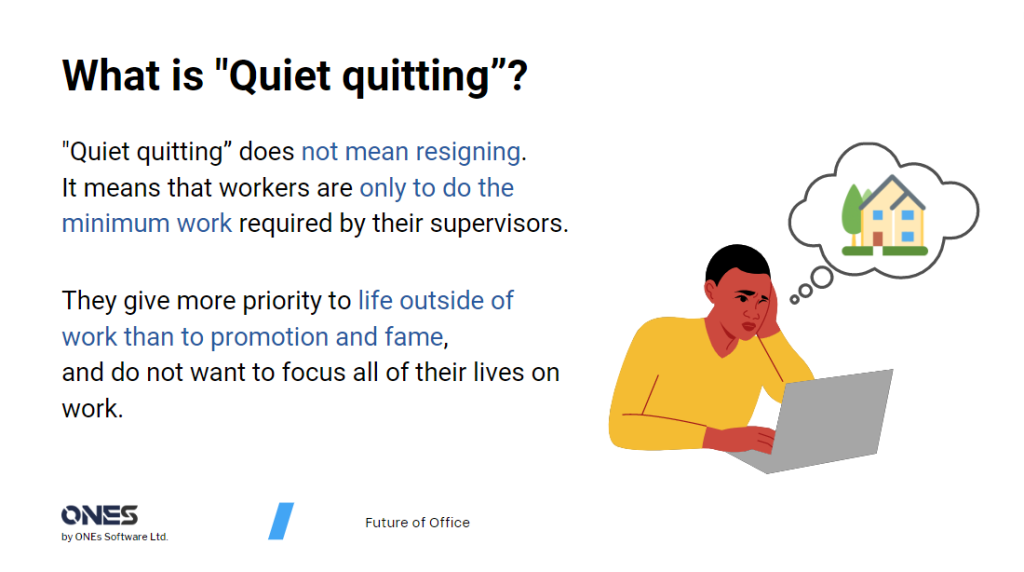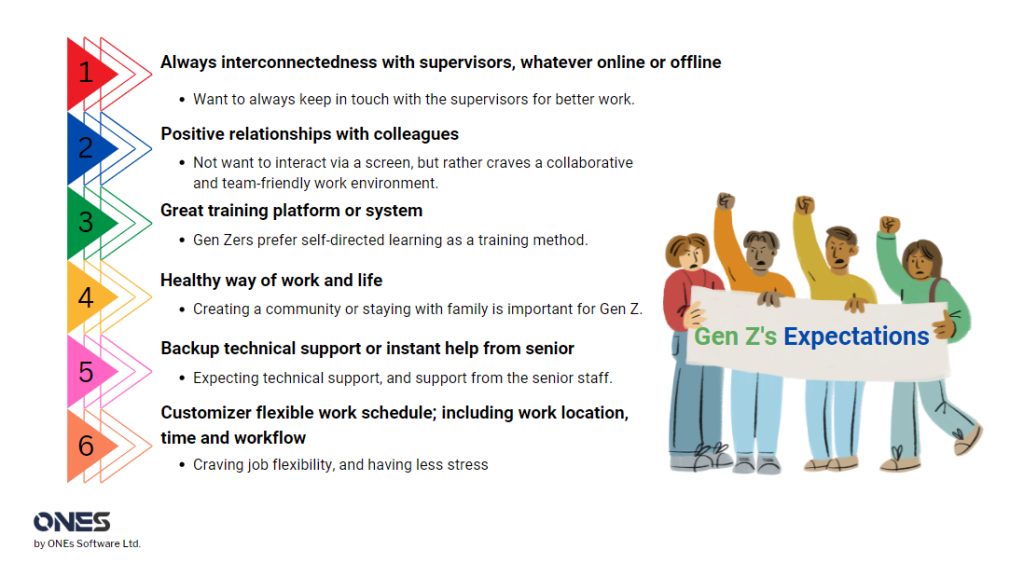The idea of “Quiet resigning” has spread like a supernova throughout the media during the past several weeks.
Compared with the new work models such as hybrid and remote working, the drawbacks of the traditional work method have obviously been shown, the best example is “Quiet quitting”.
Table of Contents
What is “Quiet quitting”?

The term “Quiet quitting” is not new, nor does it mean actually resigning. The term quiet quitting was initially coined at a Texas A&M economics symposium on diminishing ambitions in Venezuela in September 2009 by economist Mark Boldger. The term continued to be used by other figures, including writer Nick Adams and economist Thomas Sowell.
“Quite quitting” means that workers are only to do the minimum work required by their supervisors, and that’s it, nothing more.
The employees who are in “quite quitting” mode are tired of working hard on their jobs or feeling guilty about sick leave, even not going into a panic as they miss an email in the middle of the night.
These employees will give more priority to life outside of work than to promotion and fame, and do not want to focus all of their lives on work.
Paula Allen, Global Leader and Senior Vice-President of Research and Total Wellbeing at LifeWorks, outlines the following as signs of quiet quitting:
- Saying no to tasks outside of the traditional job description
- Not replying to emails or Slack messages outside of work
- Leaving work on time
- Being less emotionally invested
- No more overachieving
- Reduced interest in going above and beyond to secure a promotion at the company
Why Are People Doing It?
The appearance of “quiet quitting” is the worst result of companies’ long time to work in traditional work models. The traditional work pattern requires the workers to have long working hours and the daily target is unclear, also supposed to work in the office.
It makes the workers lose their passion for fighting for goals and the long working hours make them lose their enthusiasm for their work. This makes lots of employees join the “quiet quitting”.
Quiet Quitting Is All About Bad Bosses
Based on the survey done by Harvard Business Review, when compared to the most effective leaders, we discovered that the least effective managers have three to four times as many employees that fall into the category of “silent quitting.”
Only 20% of these supervisors’ direct reports were willing to put in extra effort, and 14% of them discreetly resigned.
However, those who were assessed as being the best at juggling relationships and results had 62% of their direct reports wanting to put in more effort and only 3% were covertly quitting.
Many people have, at some point in their careers, worked for a manager who encouraged them to quietly leave their position. Feeling undervalued and underappreciated is the cause of this. It’s possible that the management exhibited bias or inappropriate behavior. The manager’s actions caused the staff to become unmotivated.
Traditional work style damaging your company
Maggie Perkins, a former teacher already involved in “quiet quitting”, said that her children will not always be three and four years old, so she would like to spend more time with her children rather than work hard on her job.
As Maggie said, the worst impact of “quiet quitting” for a company is the reduction in productivity and efficiency. The reasons are the workers fully focus on their life, no more input on their jobs.
It is not good for Gen Z (Generation Z) in particular. Because they have the right mindset and want to succeed in the workplace. 70% of Gen Z believe it is more important to be seen as having a curious and open mindset than a specific skill or expertise. Thus, they don’t think “quiet quitting” is suitable for them.
Some data shows that if younger generations need to work in the office with the old work model, 43% of knowledge workers would consider resigning from their jobs. So, if you want to keep your talents, you must understand what Gen Z needs.
The expectations from Gen Zers

Generation Z doesn’t like to work in the old work model because it is boring, lacks flexibility in work, and has less communication with colleagues.
They advocate for having a more balanced work/life experience to help them escape the burnout that has been inflicted on older generations.
Always interconnectedness with supervisors

As reported by Forbes, 60% of Gen Z employees expressed the desire to have clarity on the expectations and parameters of their jobs, and 60% of Gen Z workers want direct, frequent communications and check-ins with their supervisors for performance evaluation.
By using collaboration tools, they can always keep in touch with their supervisors.
Positive relationships with colleagues

Gen Z doesn’t only want to interact via a screen but rather craves a collaborative and team-friendly work environment.
90% of Gen-Z workers desire and value a human connection in their professional environments. In fact, 72% of Gen Z want to communicate face-to-face at work.
Great training platform or system

Many Gen Zers prefer self-directed learning as a training method. The reason is they can learn the skills they want to know, and keep the learning with flexible. This means Gen Z prefers steady communication with their professional teams.
According to a study by Gallup’s State of the American Workforce, supervisors should help Gen Z set some training guidelines and create a platform that allows for two-way communication and easy access to resources and information.
This level of leadership ensures that your team has a greater understanding of work expectations.
A healthy way of work and life

For the Gen Z workforce, creating a community or a family is the top issue that they care about. 38% of Gen Z consider work-life balance as their number one factor in choosing your company.
Backup technical support or instant help from senior

If you don’t have up-to-date technology at your workplace, you’ll find that Gen Z in the workplace will be greatly disappointed. Some systems can support Gen Z easily to manage the workspace resources and help them work flexibly in the office, such as ONES.
60% of Gen Z-ers expect their managers to deliver feedback that is frequent and measurable to ensure that they can address difficult challenges. Also, when Gen Zers go back to the office, they want to get instant help from the senior staff through face-to-face communication.
Customizable flexible work schedule; including work location, time, and workflow

New data from NearU shows that over half (54%) of users on their platform are part of Gen Z, and these users commented that they crave job flexibility.
Flexibility is very important for Gen Z. Flexible work allows them to choose remote work or fixed work in the office. One of the best benefits for Gen Z working from home is no commute time, which can help them save both time and money.
Flexible working hours allow them to have shortened business hours, which they can have more time to take rest and then less stress.
The younger generation is the most important asset for a company, especially Gen Z. Thus, you need to fulfill their needs; otherwise, you will lose a number of the workforce in the future. To satisfy their needs, hybrid working is suitable for your office.
Be the winner in future work

To retain your future talents, you should provide flexibility for their work. Hybrid work is an approach that takes into account the individual’s needs, whether they’re at home or at the office.
It provides flexibility and autonomy for employees, and these are the key factors in the work environment. There are lots of countries that will implement hybrid working around the world.
Moreover, the research shows that more than 1 or 3 workers around the world want to maintain a hybrid work schedule. Following are the software and systems that can help you to work more closely with the staff and easy to manage the office resources:
Collaboration tools: Microsoft Viva
Microsoft Viva is an employee experience platform that brings together communications, knowledge, learning, resources, and insights in the flow of work.
Office management system: ONES
ONES is one of the famous all-in-one smart office systems that can help you to easily implement hybrid working at ease. You can easily perform virtual meetings, desk-hoteling, and digital office management with our Room Booking, Desk Booking, and Visitor Management features.
With Microsoft Viva and ONES, you can enjoy a comprehensive smart office management system on Microsoft Teams for your staff to have more connections with each other, work more closely, and easier to manage your office equipment. It allows your employees to work remotely and work at hybrid offices.
Contact us: hello@ones.software, or visit ONES Software official website for more information: https://ones.software/.

